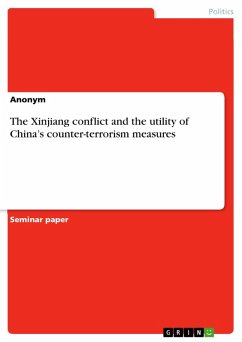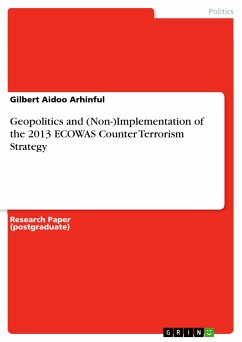Seminar paper from the year 2012 in the subject Politics - Topic: Peace and Conflict, Security, grade: 1,7, University of Bamberg, language: English, abstract: To deal with terrorism, a state needs to arm and secure itself for its defense against it, because they are existing threats. Extraordinary measures, which are nothing else than counter-terrorism policies, are important and necessary for fighting against terrorism in order to be secure. The fact that terrorism occurs worldwide and is becoming more important for states it is necessary to have effective counter-terrorism policies. But states response differently towards threats and especially to terrorism acts. The interesting question that will be discussed is: how can the divergence of counter- terrorism policy be explained? Terrorism as a threat primarily to states can occur internationally or domestically, and by defining terrorism, a state can respond to and combat terrorism in its own way, and this can be a potential factor for explaining a divergence of counter.-terrorism policy, but this will be not the emphasis of this term paper. The theoretical framework for explaining a divergence of counter- terrorism policy is the theory of securitization by Barry Buzan, Ole Waever and Jaap de Wilde, which contains assumptions of the theory of social constructivism. Inasmuch social constructivism by Alexander Wendt tells something about political culture. It neither tells much about security nor how to deal with threats especially to terrorism acts; that is why a widening analysis for the term security is needed in order to explain a divergence of counter-terrorism policy and the theory of securitization. Theory of securitization exactly explains everything about how a security term becomes a relevant issue. The frame for securitization, as written before, are core assumptions of social constructivism and those are necessary to discuss, in order to understand further explanations. This is why this term paper begins with the theoretical framework of constructivism. After the theoretical framework has been discussed, two states as empirical examples, which are the USA and Spain, shall give a better view of how states differs from their counter-terrorism policies, regarding to their different facing on terrorism acts, that are taken place. At the end, a conclusion shall repeat the core assumptions of the theoretical framework and explanations and in addition gives further impulses on other fields of analysis.
Dieser Download kann aus rechtlichen Gründen nur mit Rechnungsadresse in A, B, BG, CY, CZ, D, DK, EW, E, FIN, F, GR, HR, H, IRL, I, LT, L, LR, M, NL, PL, P, R, S, SLO, SK ausgeliefert werden.









